The Market Street Mission’s Life Change Program is a
Our Life Change Program is a long-term residential addiction recovery curriculum providing men with the skills and resources they need to achieve true, sustained sobriety.
Thanks to the support of generous partners, men can participate in the program for free, with no insurance necessary. Residents move toward recovery as:
- Individual and group counseling encourages healing
- Educational and career development prepares them for future success
- Work therapy allows them to practice work skills
- Life skills classes set the foundation for a sober life
- Medical, legal, and ID assistance removes barriers to care
- Transitional housing provides post-graduation support
- A compassionate community shows that other people care about them
Guided by our faith in Jesus, our experienced, caring staff is here to walk alongside our residents to build a firm and supportive foundation of recovery. Our program is structured to help them achieve not only abstinence from substances, but a complete life change through thinking and habits building toward long-term sobriety.
Below Describes The Focus, Environment And Requirements Of The Addiction Recovery Curriculum:
PRE-PROGRAM
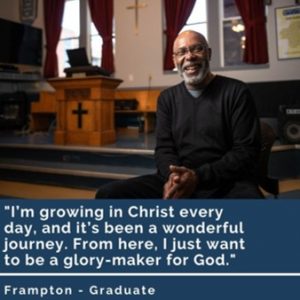 The Pre-Program phase begins once a man indicates that he would like to become a part of the Mission’s addiction recovery experience.
The Pre-Program phase begins once a man indicates that he would like to become a part of the Mission’s addiction recovery experience.
This period is designed to determine if a man could benefit from our program, provide him necessary information for a decision, and begin the process of assimilation.
One Mission resident described the Pre-Program phase as one of “settling down” – the man and the Mission get to know one another in order to begin a new relationship and determine if our addiction recovery program is the right fit
The month-long Pre-Program is the gateway and “living waiting list” for the Life Change Program, as a man stays here and gets to know the Mission before formal entry into the following phases.
PHASE 1
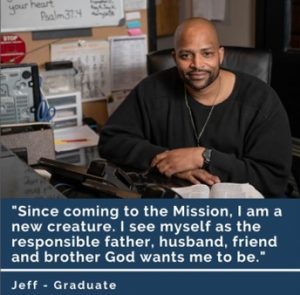 The goal of Phase 1 of the Life Change Program is to provide, through the use of work, an environment and structure for our residents to foster ongoing sobriety. Work therapy is the time for individuals to sober up their bodies and minds and to bring some structure into their lives through our addiction recovery program.
The goal of Phase 1 of the Life Change Program is to provide, through the use of work, an environment and structure for our residents to foster ongoing sobriety. Work therapy is the time for individuals to sober up their bodies and minds and to bring some structure into their lives through our addiction recovery program.
Every man is unique ‒ unique in his history, unique in his needs, and unique in his rehabilitation. Although the Mission espouses a holistic approach, i.e. viewing the person as a whole with many simultaneous problems, a man can expect a sequential process in recovery.
The primary focus of work therapy is threefold:
- To strengthen the body through physical exercise for long term recovery.
- To develop knowledge of what is needed to work in a structured environment and begin putting that knowledge into practice so that each man can develop his own work ethic.
- To apply Christian values in the workplace.
This is not to suggest that physical, mental/emotional and spiritual rehabilitation should be in sequence, but rather that normally the body recovers more quickly than the mind. We believe that a full structured drug addiction training program is needed for long term, successful recovery.
PHASE 2
Phase 2 is central to the Market Street Mission’s Life Change Program. After having progressed through Pre-Program and Phase I, the individual is a candidate for classroom instruction.
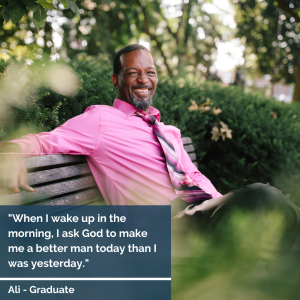
It is here that men can really come to grips with the problems in their lives and deal with them. The class topics reflect the Mission’s emphasis on recovery from drug and alcohol addiction with a Gospel Mission perspective. Mission staff and local clergy teach courses helping men recover from substance abuse and preparing them for godly, productive, sober lives after graduation.
Some of these classes include:
- Fatherhood/Manhood
- Anger Management
- Christian Financial Management
- Relapse Prevention/Chemical Dependency Education
- Employment Skills
- Basic Christian Doctrine
The four objectives of Phase 2 are:
- To help the person seeking substance abuse help understand the actual problem of substance addiction and chemical dependency.
- To help him to understand why he has physical, emotional, and spiritual problems, and how these three factors interrelate and affect his life.
- To help him learn the wholesome knowledge of the salvation of God in Jesus Christ.
- To help him learn the techniques, skills and knowledge needed to live a full, productive Christian life for the glory of God.
The overall theme of this phase can be found in:
II Corinthians 5:17: “Therefore, if anyone is in Christ, he is a new creation; old things have passed away; behold, all things have become new.”
TRANSITION
Recovery is a life-long journey that is helped by a balance of independence, accountability, and structure in a sober environment. It is our hope that alumni will stay connected with the Mission after they finish the program, and we offer several options for continued growth post-graduation.
Transition
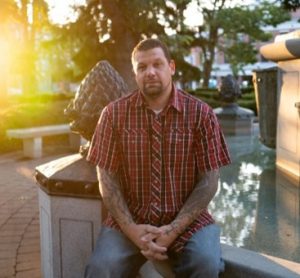 Upon completing our addiction recovery program, we offer each graduate the opportunity to reside at our facility for three months at no cost to the client, thanks to the charitable support of compassionate donors. During this time, the client may procure full-time employment, begin to save money, and plan his next steps forward in life. Clients in transition are still required to attend weekly church services and meetings, as well as meet with their sponsor/mentor.
Upon completing our addiction recovery program, we offer each graduate the opportunity to reside at our facility for three months at no cost to the client, thanks to the charitable support of compassionate donors. During this time, the client may procure full-time employment, begin to save money, and plan his next steps forward in life. Clients in transition are still required to attend weekly church services and meetings, as well as meet with their sponsor/mentor.
Sober Houses
The Market Street Mission currently owns five sober living houses in Morris and Monmouth Counties. Our sober living facilities are available to alumni of our program. While in sober living, each resident pays rent at a reduced rate, while maintaining sobriety commitments and daily accountability.
Community, accountability, and time are crucial to maintaining long-term sobriety, and sober houses provide this kind of supportive environment where our residents can develop responsibility and intentionally pursue their recovery.
Internship
Men who complete the Life Change Program may be invited to become a Mission Intern. The Mission Internship is built on II Timothy 2:2 – “What you have heard from me in the presence of many witnesses entrust to faithful men, who will be able to teach others also.”
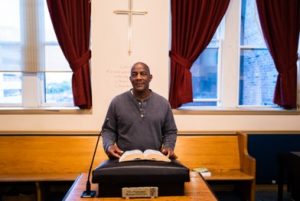 As Program graduates, Mission Interns are equipped and entrusted to carry the message of the Gospel of hope to those coming to us for help.
As Program graduates, Mission Interns are equipped and entrusted to carry the message of the Gospel of hope to those coming to us for help.
Following graduation, interns are trained to assist staff with vital Mission functions. In return, the Mission continues to work with the interns on personal, relational, and career and educational growth.
The internship also provides continued accountability, structure, housing, counseling, and training for those who participate. The program can last up to two years following graduation.
Alumni Scholarship Fund
Education is a key factor in breaking the cycle of addiction. Opportunities to grow and learn often open the door to meaningful employment, which is important in maintaining long-term sobriety.
Our Alumni Scholarship Fund exists to pay for educational needs for our Life Change Program graduates and alumni. The fund is designed to help our graduates fulfill their life mission of recovery in order to live stable, productive lives in our community while pursuing their God-given skills and interests.
In recent years, several of our alumni have graduated with degrees in clinical mental health counseling, Biblical studies, and alcohol and drug counseling. Others have received certifications as electrical contractors, medical translators, and Certified Peer Recovery Specialists. Click here to learn more.
RESTORATION AND RENEWAL
The Restoration and Renewal program takes place at our Asbury Park location. This 3-month residential treatment program is designed specifically for our alumni who have experienced a relapse in their recovery from substance use disorders. The program combines evidence-based therapeutic practices, with Christian principles and work therapy to foster spiritual growth, personal accountability, and community support. The goal is to have clients address the underlying issues contributing to their relapse and develop a sustainable recovery plan grounded in faith. The program is divided into three phases, each lasting one month, combining group therapy, individual counseling, and an integration of a 12-step model for recovery.
